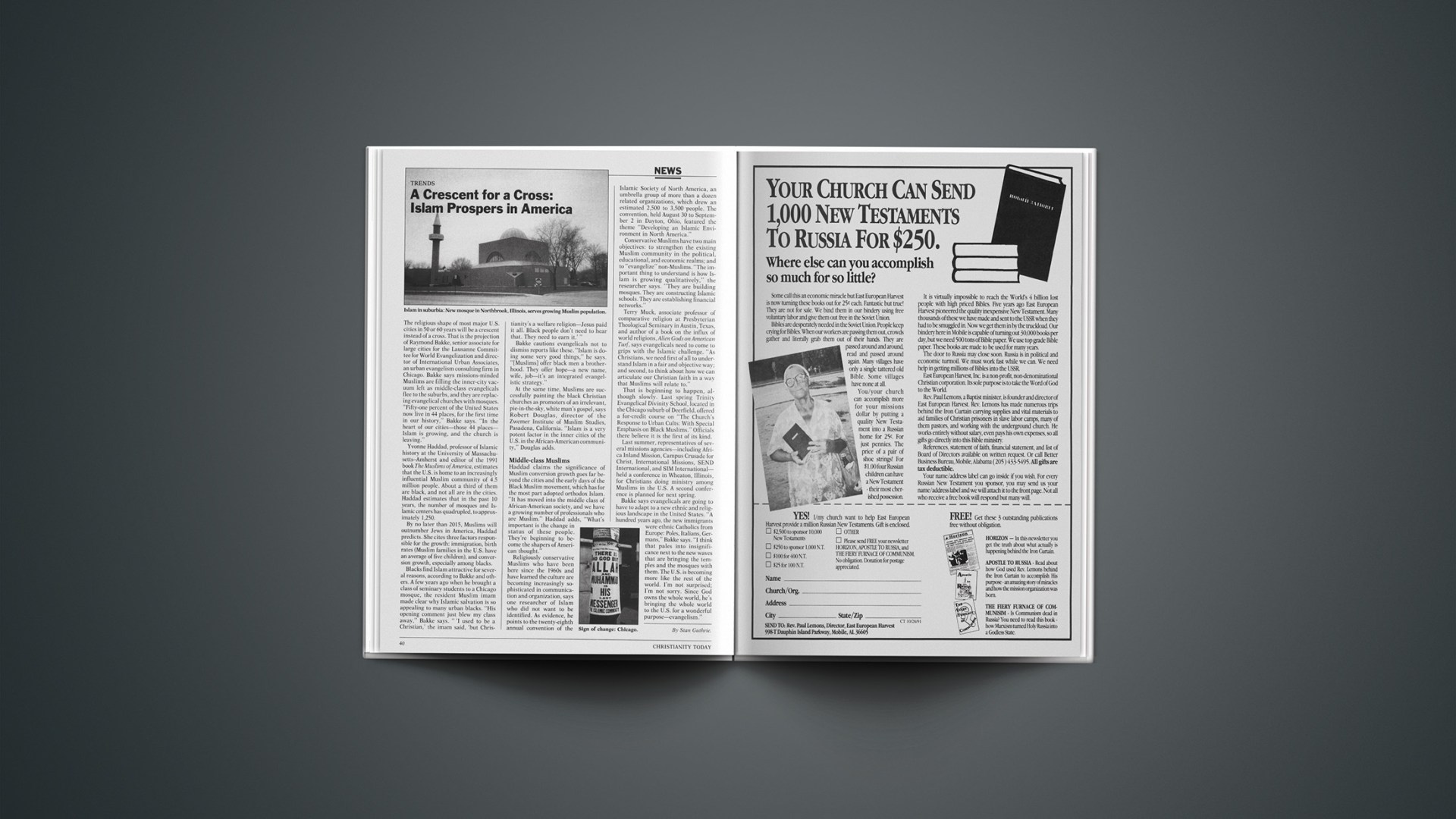The religious shape of most major U.S. cities in 50 or 60 years will be a crescent instead of a cross. That is the projection of Raymond Bakke, senior associate for large cities for the Lausanne Committee for World Evangelization and director of International Urban Associates, an urban evangelism consulting firm in Chicago. Bakke says missions-minded Muslims are filling the inner-city vacuum left as middle-class evangelicals flee to the suburbs, and they are replacing evangelical churches with mosques. “Fifty-one percent of the United States now live in 44 places, for the first time in our history,” Bakke says. “In the heart of our cities—those 44 places—Islam is growing, and the church is leaving.”
Yvonne Haddad, professor of Islamic history at the University of Massachusetts-Amherst and editor of the 1991 book The Muslims of America, estimates that the U.S. is home to an increasingly influential Muslim community of 4.5 million people. About a third of them are black, and not all are in the cities. Haddad estimates that in the past 10 years, the number of mosques and Islamic centers has quadrupled, to approximately 1,250.
By no later than 2015, Muslims will outnumber Jews in America, Haddad predicts. She cites three factors responsible for the growth: immigration, birth rates (Muslim families in the U.S. have an average of five children), and conversion growth, especially among blacks.
Blacks find Islam attractive for several reasons, according to Bakke and others. A few years ago when he brought a class of seminary students to a Chicago mosque, the resident Muslim imam made clear why Islamic salvation is so appealing to many urban blacks. “His opening comment just blew my class away,” Bakke says. “ ‘I used to be a Christian,’ the imam said, ‘but Christianity’s a welfare religion—Jesus paid it all. Black people don’t need to hear that. They need to earn it.’ ”
Bakke cautions evangelicals not to dismiss reports like these. “Islam is doing some very good things,” he says. “[Muslims] offer black men a brotherhood. They offer hope—a new name, wife, job—it’s an integrated evangelistic strategy.”
At the same time, Muslims are successfully painting the black Christian churches as promoters of an irrelevant, pie-in-the-sky, white man’s gospel, says Robert Douglas, director of the Zwemer Institute of Muslim Studies, Pasadena, California. “Islam is a very potent factor in the inner cities of the U.S. in the African-American community,” Douglas adds.
Middle-Class Muslims
Haddad claims the significance of Muslim conversion growth goes far beyond the cities and the early days of the Black Muslim movement, which has for the most part adopted orthodox Islam. “It has moved into the middle class of African-American society, and we have a growing number of professionals who are Muslim.” Haddad adds, “What’s important is the change in status of these people. They’re beginning to become the shapers of American thought.”
Religiously conservative Muslims who have been here since the 1960s and have learned the culture are becoming increasingly sophisticated in communication and organization, says one researcher of Islam who did not want to be identified. As evidence, he points to the twenty-eighth annual convention of the Islamic Society of North America, an umbrella group of more than a dozen related organizations, which drew an estimated 2,500 to 3,500 people. The convention, held August 30 to September 2 in Dayton, Ohio, featured the theme “Developing an Islamic Environment in North America.”
Conservative Muslims have two main objectives: to strengthen the existing Muslim community in the political, educational, and economic realms; and to “evangelize” non-Muslims. “The important thing to understand is how Islam is growing qualitatively,” the researcher says. “They are building mosques. They are constructing Islamic schools. They are establishing financial networks.”
Terry Muck, associate professor of comparative religion at Presbyterian Theological Seminary in Austin, Texas, and author of a book on the influx of world religions, Alien Gods on American Turf, says evangelicals need to come to grips with the Islamic challenge. “As Christians, we need first of all to understand Islam in a fair and objective way; and second, to think about how we can articulate our Christian faith in a way that Muslims will relate to.”
That is beginning to happen, although slowly. Last spring Trinity Evangelical Divinity School, located in the Chicago suburb of Deerfield, offered a for-credit course on “The Church’s Response to Urban Cults: With Special Emphasis on Black Muslims.” Officials there believe it is the first of its kind.
Last summer, representatives of several missions agencies—including Africa Inland Mission, Campus Crusade for Christ, International Missions, SEND International, and SIM International—held a conference in Wheaton, Illinois, for Christians doing ministry among Muslims in the U.S. A second conference is planned for next spring.
Bakke says evangelicals are going to have to adapt to a new ethnic and religious landscape in the United States. “A hundred years ago, the new immigrants were ethnic Catholics from Europe: Poles, Italians, Germans,” Bakke says. “I think that pales into insignificance next to the new waves that are bringing the temples and the mosques with them. The U.S. is becoming more like the rest of the world. I’m not surprised; I’m not sorry. Since God owns the whole world, he’s bringing the whole world to the U.S. for a wonderful purpose—evangelism.”
By Stan Guthrie.










